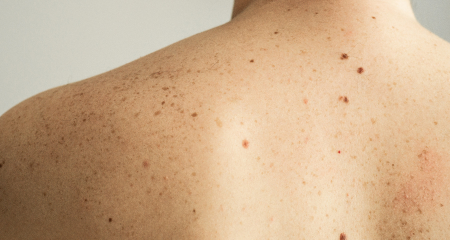
Skin cancer is the most common type of cancer in the United States, affecting one in three people in Texas. The board-certified dermatologists at Northstar Dermatology are highly skilled in performing full-body screenings to detect skin cancer and are experts in the surgical treatment of all skin cancer types. Prevention and early detection are essential, and our team is committed to educating patients on the best practices to reduce the risk of developing skin cancer.
While melanoma is often the most recognized form of skin cancer, it is actually less common. Basal cell carcinoma and squamous cell carcinoma affect more individuals and require expert assessment and care.
Basal Cell Carcinoma is the most common type of skin cancer. Although it is not typically life-threatening, if left untreated, it can grow and invade surrounding tissues. Basal Cell Carcinoma is usually caused by prolonged UV exposure from the sun or indoor tanning. Individuals with lighter skin tones, a history of sunburns, red hair, or freckles are often more prone to developing it. Those who work outdoors or live in areas with year-round sun are also at a higher risk. If you notice a persistent spot or a scaly patch that doesn’t heal, it may be a sign of Basal Cell Carcinoma. Contact a board-certified dermatologist for an expert evaluation.
Squamous Cell Carcinoma is the second most common form of skin cancer, often resulting from UV exposure, either from the sun or indoor tanning. Unlike Basal Cell Carcinoma, Squamous Cell Carcinoma can spread to other areas of the body, potentially leading to serious health risks. Although it generally grows slowly, early treatment is essential to prevent metastasis. It may appear as a non-healing spot, a persistent scaly patch, or a wart-like growth. If you notice any of these signs or detect new or changing spots, reach out to a board-certified dermatologist for a thorough evaluation.
At Northstar Dermatology, our physicians specialize in the surgical treatment of all types of skin cancer. The primary approach is often surgical excision, where the dermatologist removes the cancerous tissue along with a margin of surrounding tissue to ensure complete removal. The area is then closed with sutures, and some downtime may be necessary, with activity restrictions on lifting and strenuous movements for a few weeks.
For more superficial or early-stage skin cancers, non-surgical treatments such as Electrodessication and Curettage or chemotherapy injections may be considered. In cases involving larger skin cancers or those located in cosmetically sensitive areas, a referral to a Mohs surgeon may be recommended for precise removal.
A Skin Cancer Screening is a comprehensive, head-to-toe evaluation designed to identify any suspicious spots or potential skin cancers. Once comfortably in a gown, our specialist will begin a detailed skin examination to assess and document any notable “spots.” Certain lesions may be examined more closely with a dermatoscope, a specialized magnifying light that reveals deeper characteristics of the skin.
If any lesions appear suspicious for skin cancer or abnormality, your specialist may recommend a skin biopsy for diagnosis confirmation. A biopsy is a quick procedure where a sample of the lesion is taken and sent to a lab for analysis. During the screening, pre-cancerous spots (such as actinic keratoses) and some benign lesions may also be treated.
These screenings focus solely on identifying potential skin cancers and providing education on lesions observed during the exam. Other concerns, like acne or rashes, typically require a separate appointment.
Skin cancer screenings are beneficial for everyone, no matter the skin type. However, some people have certain features or factors which increase the risk for developing skin cancer:
• Family history of skin cancer
• Personal history of sunburns, especially blistering sunburns
• Personal history of extended sun exposure (working outdoors, outdoor sports, outdoor
recreation such as boating, pool, beach, etc.)
• Personal history of indoor tanning
• Fair complexion
• Red hair or light hair
• A plethora of moles
If any of the above are applicable to you, it is imperative that you request a head-to-toe skin cancer screening.
